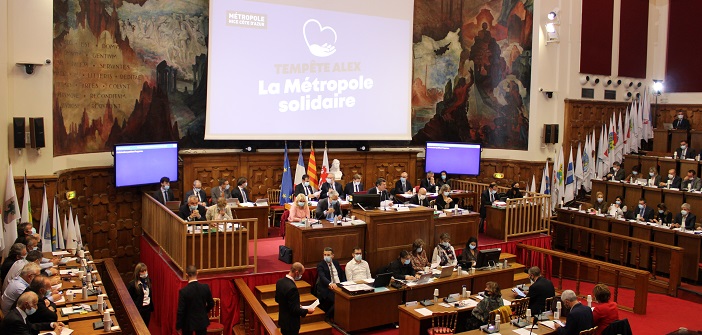The Metropolitan Council has formally approved two major projects for its mobility policy: the review of the consultations for tram line 4, which will connect the west of Nice with Saint-Laurent du Var and Cagnes sur Mer, and the creation of a High-Level Bus Line (BHN) on a dedicated route between tramway L1’s park-and-ride and the Promenade des Anglais. Both projects are part of the objective to promote public transportation and, as a result, make transportation less polluting in a few years.
In the same “green&blue” approach, other resolutions have been adopted: the granting of financial aid to accelerate the energy renovation of the private housing stock, as well as an agreement with AtmoSud for the assessment of greenhouse gas emissions with the evolution of road traffic.
Furthermore, via an agreement with the relevant Ministry, road noise control will be conducted with the implementation of a radar. How can one not welcome such an initiative when traffic lanes are often transformed into racetracks for cars and motorcycles?
A new initiative has been proposed under the title of renewable energies with a focus on photovoltaic energy. A first project for a power plant in Levens has been approved. This project did not escape criticism from the ecologist councilor (more activist than councilor) Sylvie Bonaldi: “it is actually aimed at making 20 hectares of natural area buildable”! Unfortunate for her that we haven’t yet found a solution to make wind turbines fly in the sky!
Similarly, to promote metropolitan agricultural land and food policy (short circuits), a framework agreement with the Chamber of Agriculture and other public bodies and associations will allow the creation of a Metropolitan Agricultural Test Space.
An initial example will be realized on the Boulevard des Jardiniers, next to the Allianz Riviera, following the acquisition of this property by the Nice city council for the Metropolis. Here too, Mrs. Bonaldi (EELV) did not miss the opportunity to express herself in caustic terms: “This is not about reclaiming and preserving a farming operation because the land already belonged to the community!” Thankfully, she shares her insights with us, allowing us to combine the absurd with the grotesque. No surprise, this is the same person who advised against wearing masks because it allegedly impaired brain oxygenation!
Switching from future perspectives to the present, the session also had to approve the management and administrative accounts: it was Vice-President Philippe Pradal who took charge, after Christian Estrosi recalled the extraordinary and clearly unpredictable events that have affected the exercise, namely the pandemic and storm Alex: “Despite the cost of the crisis, the figures presented attest to the resilience of our territory.”
The official, as President of the Finance Commission, highlighted the good management thanks to the control of operating costs and particularly favorable debt financing rates (less than 2%), which made it possible to cover expenses for Covid (66 million euros) and emergency interventions in the valleys affected by storm Alex, without reducing the amount of programmed investments (140 million euros), even slightly increasing them (144.5 million euros).
Despite this reassuring financial statement, it was not enough to escape criticism from Jean-Christophe Picard (EELV), (those “watermelons” are decidedly doctrinaire!), who pointed out the increase in borrowing (171 million euros) against a repayment of 146 million euros. A negative sign for him, as he wanted to remind everyone of the debt total, at 1.6 billion euros.
Finally, to move beyond the small scope of day-to-day affairs and look ahead as far as possible, two resolutions were voted on: the first, for a call for projects in the field of Artificial Intelligence (AI); the other for a partnership with UCA for the ETI chair (Entrepreneurship-Territory-Innovation).


